| Srl | Item |
| 1 |
ID:
087551
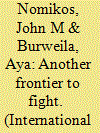

|
|
|
| 2 |
ID:
087554
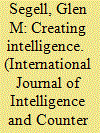

|
|
|
|
|
| Publication |
2009.
|
| Summary/Abstract |
Intelligence is not just about gathering and analyzing information. It is also about the provision of information. This information is provided by specific operations task forces that are now integral units in any military operation. The purpose of these units is neither deception nor the provision of misinformation to a military adversary. Instead, their purpose is to persuade a target population not to support an adversary and to dissuade any activity that might hamper allied victory. Offering the adversarial population a realistic better future than the opposition leadership or terrorists are able to offer-done through an information and psychological warfare campaign-can reduce casualties and the length of any armed conflict. But providing accurate information is essential for credibility. Manipulation of a population that provides manpower and other support to an adversary was deemed a prudent United States-Great Britain strategy in the Iraq conflict after the demise of the Baath regime.
|
|
|
|
|
|
|
|
|
|
|
|
|
|
|
|
| 3 |
ID:
087558


|
|
|
|
|
| Publication |
2009.
|
| Summary/Abstract |
The discipline recognizes that its domain is as much defined by the characteristic forms of its reasoning, the intrinsic nature of its knowledge and information, and its competing theories of concepts and their relationships-as by the elementary specification of raw material, scale of study, and methodology. Explanation, interpretation, concepts and theory become central topics of debate. …Archaeologists need to know about knowing and the limits of what they can and cannot know from the data and to know this by critical appraisal, not simply by assertion. Demoralizing but fundamental questioning develops given what we know about the limitations of the data, concepts and methods
|
|
|
|
|
|
|
|
|
|
|
|
|
|
|
|
| 4 |
ID:
087556
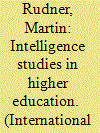

|
|
|
|
|
| Publication |
2009.
|
| Summary/Abstract |
Intelligence Studies as an academic discipline was slow to develop in universities. Perhaps the cause was the secrecy attaching to intelligence matters, or the reluctance of academe to engage with clandestine services, or the fear of being subverted by covert organizations, but universities in most countries seemed disinclined to embark on teaching or research programs relating to the Intelligence domain. A few universities, most notably in the United States, United Kingdom, Canada, Germany, and Israel, offered individual courses on intelligence Studies topics during the Cold War era, though mainly in the field of intelligence history.
|
|
|
|
|
|
|
|
|
|
|
|
|
|
|
|
| 5 |
ID:
087549
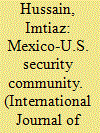

|
|
|
|
|
| Publication |
2009.
|
| Summary/Abstract |
Intelligence without policy simply means awareness not backed up by, or translated into, action, while policy without intelligence encapsulates action without preparation. Because the post-11 September 2001 (9/11) Mexico-US security incompatibility stems from both design and default, blaming politicians or administrative officials for existing gaps does nto help.
|
|
|
|
|
|
|
|
|
|
|
|
|
|
|
|
| 6 |
ID:
087546


|
|
|
|
|
| Publication |
2009.
|
| Summary/Abstract |
Chemical and biological weapons are commonly referred to as weapons of mass destruction (WMD) because of their potential to kill thousands of people indiscriminately. This high lethality means that the manufacture, storage, and use of such weapons on the national level are generally forbidden, except for purely defensive research.
|
|
|
|
|
|
|
|
|
|
|
|
|
|
|
|
| 7 |
ID:
087557
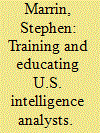

|
|
|
|
|
| Publication |
2009.
|
| Summary/Abstract |
In the United States, the training and education of national security intelligence analysts in both government and academia is undergoing significant changes. Most of them are associated with efforts to improve the quality of analysis in the wake of the 11 September 2001 (9/11) terrorist attacks on New York City and Washington, D.C., and the controversy over the accuracy of intelligence regarding Iraq's weapons of mass destruction (WMD) programs. Additional changes are likely as analytic training is subsumed into a broader national effort to professionalize the country's analytic corps.
|
|
|
|
|
|
|
|
|
|
|
|
|
|
|
|